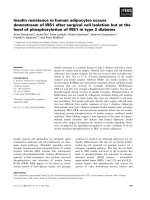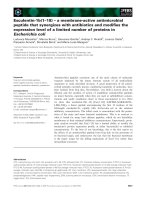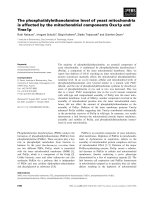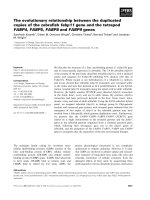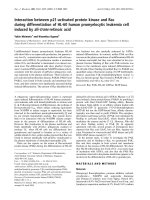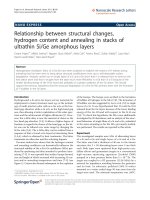Association between the selected independent variables and the knowledge level of farmers about recommended production technology of fennel
Bạn đang xem bản rút gọn của tài liệu. Xem và tải ngay bản đầy đủ của tài liệu tại đây (235.31 KB, 10 trang )
Int.J.Curr.Microbiol.App.Sci (2017) 6(5): 2375-2384
International Journal of Current Microbiology and Applied Sciences
ISSN: 2319-7706 Volume 6 Number 5 (2017) pp. 2375-2384
Journal homepage:
Review Article
/>
Association between the Selected Independent Variables and the Knowledge
Level of Farmers about Recommended Production Technology of Fennel
Sunil Kumar Sharma1*, N.K. Sharma2, Anand Kumar1 and Deepak Chaturvedi3
1
2
Agriculture Research Station, SKRAU, Bikaner (Rajasthan), India
Department of Extension Education SKNAU Jobner, Jaipur (Rajasthan), India
3
Department of Extension Education SKRAU, Bikaner, India
*Corresponding author:
ABSTRACT
Keywords
Fennel growers,
Association,
Knowledge,
Significant,
Non-significant.
Article Info
Accepted:
25 April 2017
Available Online:
10 May 2017
Seed spices occupy prominent place in the total basket of spices of the country and play a
significant role in our national economy. The group of spices account for about 37 per cent
and 18 per cent of the total area and production of spices in the country, respectively.
Fennel (Foeniculum vulgare) commonly known as ‘Saunf’ is an important and highly
valued spice grown in India. This crop is widely grown throughout the temperate and
subtropical region of the world for its aromatic fruits used in various food preparations
such as soups, meat dishes, sauces, pastries, confectionaries, pickles, liquors etc. The
fennel seeds are aromatic, stimulants and carminative. Rajasthan is the third largest
producer of spices in the country and accounts for 12.48 % of the total production of major
spices. The major fennel producing districts of Rajasthan are Nagaur, Sirohi, Jalore,
Dausa, Tonk, Sawai Madhopur and contribute above 90 per cent of area and production of
fennel crop. Fennel is an important commercial cash crop of arid and semi arid region.
There is a wide scope to improve and increase the fennel production and productivity by
enhancing the knowledge and adoption of fennel production technology. The present study
was conducted in eight villages (four villages from Mertacity tehsil and four villages from
Degana tehsil) in Nagaur district of Rajasthan. A sample of 120 fennel growers was
selected from these selected villages by using simple random sampling with proportion
sample method. The results indicated that the age, education and annual income were
found to be positive and significantly associated with the knowledge level of farmers about
fennel production technology. While, the variables like, caste, size of land holding, family
type and family size were found to be non-significantly associated with the knowledge
level of farmers about fennel production technology.
Introduction
India is known the world over as 'The Home
of Spices', thus Spices and condiments need
no introduction. The climate of the country is
ideal for the growth of almost all spices.
Spices are an important group of agricultural
goods, which are virtually indispensable in
the culinary art.
They also play a significant role in our
national economy and also in the economies
of several spice producing, exporting and
importing countries. India accounts for about
45% of the global spice exports. In India,
from the point of view of both domestic
consumption and export, spices are important
commercial crops.
2375
Int.J.Curr.Microbiol.App.Sci (2017) 6(5): 2375-2384
Seed spices occupy prominent place in the
total basket of spices of the country and play a
significant role in our national economy. The
group of spices accounts for about 37 per cent
and 18 per cent of the total area and
production of spices in the country,
respectively. Seed spices are mainly
cultivated in the states of Rajasthan, Gujarat,
Andhra Pradesh, and Madhya Pradesh.
Among these fennel, coriander, cumin,
fenugreek, and Ajwain are cultivated on
sizeable acreage as compared to other spices.
It is the world‟s largest producer, consumer
and exporter of seed spices which are being
cultivated widely in the country over different
agro climatic zones. Seed spices are not only
for home consumption but also for improving
economic status of the farmers. In India
fennel is cultivated over an area of 1,00,000
ha with the production of 1,43,000 MT and
productivity of 1,430 kg/ha (Anonymous.
2010-11).
Fennel (Foeniculum vulgare) commonly
known as „Saunf‟ is an important dominant
and highly valued spice grown in India. This
crop is widely grown throughout the
temperate and subtropical region of the world
for its aromatic fruits used in various food
preparations such as soups, meat dishes,
sauces, pastries, confectionaries, pickles and
liquors etc. The fennel seeds are aromatic,
stimulants and carminative.
Fennel oil is used as a flavoring agent in
various culinary preparation, confectionary
cordials and liquors. The percentage volatile
oil in seed varies from 1.5 to 3.5 per cent. It
contains 14-22 per cent protein with 12 to
18.5 per cent fat. It is used as a gripe water
given to colicky infants. It is used to relieve
bronchial spasms because of its antispasmodic
properties. It targets the smooth muscles of
the respiratory system, stomach muscles and
intestines. Herbalists have used it for
centuries to induce milk production in nursing
mothers. Rajasthan is the third largest
producer of spices in the country and accounts
for 12.48 of the total production of major
spices. The state produces about 6,96,700
tones of seed spices from an area of 9,01,628
ha with productivity 4,832 kg/ha.
The major fennel producing districts of
Rajasthan are Nagaur, Sirohi, Jalore, Dausa,
Tonk, Sawai Madhopur and occupy above 90
per cent of area and production of fennel crop.
The average area, production and productivity
of last five years are 13,404 ha, 11,085 tones,
827 kg/ha respectively (Anonymous. 201011). So there are possibilities to increase its
production by 40 to 50 per cent by adoption
of improved technologies.
Fennel is an important commercial cash crop
of arid and semi arid region. The production
of spices is largely in the hands of small and
marginal farmers and the level of productivity
of most of the spices in India is below the
level as prevailing in other countries. The
lower productivity is attributed to lack of
knowledge of high yielding varieties, ravages
due to pest and diseases, inadequate postharvest technology and poor processing and
storage facilities. Keeping this fact in view
the present study entitled “The knowledge
and Adoption of Recommended Production
Technology of Fennel Cultivation by the
Farmers in Nagaur District of Rajasthan” was
undertaken.
Materials and Methods
The present investigation was conducted in
purposively selected Nagaur district of
Rajasthan state highest area and great
potential of increasing production and
productivity. The researches himself is
resident of the area and acquainted with the
farmers and their local dialect which
facilitated easy rapport building and authentic
data collection from the farmers.
2376
Int.J.Curr.Microbiol.App.Sci (2017) 6(5): 2375-2384
The selected consist of twelve tehsils, Out of
which two tehsils namely Mertacity and
Degana with maximum area under fennel
crop production were selected for the study
purpose. Separate lists of gram panchayats of
the selected tehsils were prepared with the
help of concerned „patwaries‟ of the
Mertacity and Degana tehsils. Mertacity and
Degana tehsils comprise of 42 and 34 gram
panchayats respectively. Out of which two
gram panchayats (Dava and Jaroda kala) from
Mertacity tehsil and two gram panchayats
(Sanjoo and Chonsli) from Degana tehsil
were selected on proportionate random basis.
Initially, a complete list of all the major
fennel growing villages of the selected tehsils
was prepared in consultation with the
personnel of revenue department and
Agriculture department of the concerned area.
From the list so prepared, 4 villages from
each Tehsil were identified on the random
basis under fennel crop. Thus, in all eight
villages were selected for the present
investigation.
A comprehensive list of all fennel growers
was prepared separately for all selected
villages of identified tehsils. In preparing the
list, the help of revenue personnel and
agricultural supervisor of the concerned area
was taken for authenticity and counter check
of information. Then after the farmers were
categorized in to three categories i.e. large,
small and marginal farmers.
Following the procedure laid down above a
sample of total 15 respondents i.e. 5 in each
category from every selected village was
drawn randomly. Thus the study sample for
the present investigation was comprised 120
respondents. (i.e. 60 from each Tehsil).
Keeping in mind the objectives of study, the
interview schedule was developed for the
collection of data from the selected
respondents.
Association between selected personal
variables of the respondents with their
level of knowledge of recommended fennel
production technology
This section of the chapter deals with the
association between the level of knowledge
and selected personal variables viz., age,
education, annual income, caste, size of land
holding, family type and family size of fennel
growers. To find out the association between
these personal characteristics and the level of
knowledge, chi-square test was applied. The
results have been presented in subsequent
tables.
Association between age of the respondents
and level of knowledge
Hypothesis
NH11 : There is no association between
age of respondents and knowledge
of fennel production technology.
RH11 : There is an association between age
of respondents and knowledge of
fennel production technology.
An observation of data in table 1 shows that
out of total 19 respondents in age group less
than 35 years, 8 (42.11%), 8 (42.11%) and 3
(15.789%) were having low, medium and
high level of knowledge of improved fennel
cultivation technology respectively. In the age
group of 35 to 53 years, 25 (59.52%),
10(23.81%) `and 7 (16.67%) farmers had low,
medium and high level of knowledge
respectively. While, in the age group of above
53 years, 7(11.86%), 22 (37.29%) and 30
(50.85%) respondents possessed low, medium
and high level of knowledge of improved
practices of fennel cultivation, respectively.
The data in table 1 further indicate that the
calculated chi-square value (29.782) was
higher than tabulated value therefore, the null
2377
Int.J.Curr.Microbiol.App.Sci (2017) 6(5): 2375-2384
hypothesis (NH11) was rejected. This reveals
that there existed an association between age
of respondents and knowledge of fennel
production technology.
The present finding is in conforming to that of
Kumar et al., (2013) who revealed that
antecedent variables like knowledge and age,
education level, and size of land holding were
found to be positively and significantly
associated with the knowledge level of
farmers
about
coriander
production
technology.
Association between education and level of
knowledge
of
recommended
fennel
production technology
Hypothesis
NH12 : There is no association between
education of respondents and
knowledge of fennel production
technology.
RH12 : There is an association between
education of respondents and
knowledge of fennel production
technology.
The results in table 2 indicate that out of total
19 fennel growers in illiterate group, 5
(26.32%), 4 (21.00%) and 10 (52.63%)
possessed low, medium and high level of
knowledge of improved practices of fennel
cultivation respectively. In the group of up to
primary level, 12 (35.29%), 14 (41.18%), and
8 (23.53%) respondents had low, medium and
high level of knowledge respectively. In the
group of primary level to middle level of
education, 11 (61.11%), 2 (11.00%) and 5
(27.78%) respondents reported in low,
medium and high level of knowledge
respectively. While, in the group of above
middle level of education, 12 (24.49%), 20
(40.82%) and 17 (34.69%) respondents were
observed in low, medium and high level of
knowledge about improved fennel cultivation
technology.
Further the data in table 2 indicate that the
calculated chi-square value (13.910) was
higher than tabulated value therefore, the null
hypothesis (NH12) was rejected. This reveals
that there existed an association between
education of respondents and knowledge of
fennel production technology.
The present finding is in conformity with that
of Kumar et al., (2013) who revealed that
antecedent variables like knowledge and age,
education level, and size of land holding were
found to be positively and significantly
associated with the knowledge level of
farmers
about
coriander
production
technology.
Association between annual income of
respondents and level of knowledge of
recommended
fennel
production
technology
Hypothesis
NH13 : There is no association between
annual income of respondents and
knowledge of fennel production
technology.
RH13 : There is an association between
annual income of respondents and
knowledge of fennel production
technology.
The data accorded in table 3 show that 36
(57.14%), 23 (36.51%) and 4 (6.35%) less
than 90,000
income farmers had low,
medium and high level of knowledge about
fennel production technology respectively.
Whereas, 90,000 to 1,75,000annual income
farmers who possessed low, medium and high
level of adoption were 2 (14.29%),7 (50.00%)
and 5 (35.71%) respectively. In the income
category of more than 1,75,000, 2 (4.65%), 10
(23.26%) and 31 (72.09%) farmers were
2378
Int.J.Curr.Microbiol.App.Sci (2017) 6(5): 2375-2384
observed in the low, medium and high
knowledge category, respectively.
medium and high level of knowledge about
fennel production technology.
Further the data in table 3 indicate that the
calculated chi-square value (58.683) was
higher than tabulated value, therefore, the null
hypothesis (NH13) was rejected. This reveals
that there existed an association between
annual income of respondents and knowledge
of fennel production technology.
It could be further observed from table 4 that
calculated chi-square value (1.987) was less
than tabulated value. Therefore, the null
hypothesis (NH14) was accepted. This reveals
that there is no association between caste of
respondents and knowledge of fennel
production technology. It could be inferred
that caste did not play a significant role in
knowledge level of fennel production
technology among the farmers of the study
area. The present finding is in conformity
with that of Kumar et al., (2013) revealed that
farmer‟s knowledge and caste, family size,
and family type were found to be non –
significantly associated with regard to
recommended
coriander
production
technology. The findings of this study could
be supported by the findings of Chodhary
(1999), Meena (2001), Jaitawat and Sharma
(2008), Jangid (2001) Mahendra singh (2012)
and Surendra kumar (2013).
The present finding is in conformity with that
of Kumar et al., (2013) who revealed that
antecedent variables like knowledge and age,
education level, and size of land holding were
found to be positively and significantly
associated with the knowledge level of
farmers
about
coriander
production
technology.
Association between caste of respondents
and level of adoption of recommended
fennel production technology
Hypothesis
NH14 : There is no association between
caste of respondents and knowledge
of fennel production technology.
RH14 : There is an association between
caste of respondents and knowledge
of fennel production technology.
The data in table 4 indicate that out of total 29
fennel growers in scheduled caste 11
(37.93%), 10 (34.48%) and 8 (27.59%)
possessed low, medium and high level of
knowledge respectively about improved
practices of fennel production. In the group of
OBC12 (26.67%), 15 (33.33%) and 18
(40.00%) respondents had low, medium and
high level of knowledge about fennel
production technology.
Whereas, in the
group of general 17 (36.96%), 15 (32.61%)
and 14 (30.43%) respondents had low,
Association between size of land holding of
respondents and level of knowledge of
recommended
fennel
production
technology
Hypothesis
NH15 : There is no association between
size of land holding of respondents
and
knowledge
of
fennel
production technology.
RH15 : There is an association between
size of land holding of respondents
and
knowledge
of
fennel
production technology.
The data accorded in table 5 show that 9
(22.50%) 10 (25.00%) and 21 (52.50%)
marginal farmers had low, medium and high
level of knowledge about fennel production
technology respectively. Whereas, small
farmers who possessed low, medium and high
2379
Int.J.Curr.Microbiol.App.Sci (2017) 6(5): 2375-2384
level of knowledge were 8(20.00%), 12
(30.00%) and 20 (50.00%) respectively. In the
category of large farmers, 5 (12.50%), 17
(42.50%) and 18 (45.00%) farmers were
observed in the low, medium and high
knowledge category, respectively. The data
further show that calculated chi-square value
(3.419) was less than tabulated value. Thus,
the null hypothesis (NH15) was accepted and
research hypothesis was rejected. This nonsignificant value shows that there is no
association between size of land holding and
knowledge of fennel production technology.
Hence, it is concluded that land holding did
not play a significant role in knowledge of
fennel production technology in the study
area.
The present finding is in conformity with that
of Kumar et al., (2013) revealed that farmer‟s
knowledge and caste, family size, and family
type were found to be non – significantly
associated with regard to recommended
coriander production technology.
Association between family type of
respondents and level of knowledge of
recommended
fennel
production
technology
possessed low, medium and high level of
knowledge respectively about improved
practices of fennel production. In the group of
joint family composition 22 (41.51%), 18
(33.96%) and 13 (24.53%) respondents had
low, medium and high level of knowledge
about fennel production technology.
It could be further observed from table 6 that
calculated chi-square value (4.123) was less
than tabulated value. Therefore, the null
hypothesis (NH16) was accepted. This reveals
that there is no association between family
type of respondents and knowledge of fennel
production technology. It could be inferred
that family type did not play a significant role
in knowledge level of fennel production
technology among the farmers of the study
area.
The present finding is in conformity with that
of Kumar et al., (2013) revealed that farmer‟s
knowledge, caste, family size and family type
were found to be non – significantly
associated with regard to recommended
coriander production technology.
Association between family size of
respondents and level of knowledge of
recommended
fennel
production
technology
Hypothesis
NH16 : There is no association between
family type of respondents and
knowledge of fennel production
technology.
RH16 : There is an association between
family type of respondents and
knowledge of fennel production
technology.
The data in table 6 indicate that out of total 67
fennel growers in single family composition
18 (26.87%), 22 (32.84%) and 27 (40.298%)
Hypothesis
NH17 : There is no association between
family size of respondents and
knowledge of fennel production
technology.
RH17 : There is an association between
family size of respondents and
knowledge of fennel production
technology.
2380
Int.J.Curr.Microbiol.App.Sci (2017) 6(5): 2375-2384
Table.1 Association between age of respondents and level of knowledge of
recommended fennel production technology
n = 120
Age category
<35 years (young)
35-53 years (adult)
>53 years (old)
Level of knowledge
Low
Medium
High
1
1
8 (42.11)
8 (42.11)
3 (15.789)1
(20.00)2
(20.00)2
(7.50)2
25 (59.52)1
10(23.81)1
7 (16.67)1
(62.50)2
(25.00)2
(17.50)2
1
1
7 (11.86)
22(37.29)
30 (50.85)1
(17.50)2
(55.00)2
(75.00)2
40 (33.33)1
40(33.33)1
C-TOTAL
(100)2
(100)2
*Significant at 1 per cent level of significance
1 = Percentage of row
2 = Percentage of column
R-Total
X2 value
19 (100)1
(15.83)2
42 (100)1
(35.00)2
59 (100)1
(49.17)2
29.782*
40 (33.33)1
(100)2
120 (100)
R = Row
C = Column
Table.2 Association between education of respondents and level of knowledge of
recommended fennel production technology
n=120
Education level
Low
Level of knowledge
Medium
High
R-Total
5 (26.32)
(12.50)
4 (21.00)
(10.00)
10 (52.63)
(25.00)
19 (100)
(15.83)
12(35.29)
(30.00)
11(61.11)
(27.50)
12(24.49)
(30.00)
14(41.18)
(35.00)
2 (11.00)
(5.00)
20(40.82)
(50.00)
8 (23.53)
(20.00)
5 (27.78)
(12.50)
17 (34.69)
(42.50)
34 (100)
(28.33)
18 (100)
(15.00)
49 (100)
(40.83)
40(33.33)
40(33.33)
C-Total
(100)
(100)
**Significant at 5 per cent level of significance
1 = Percentage of row
2 = Percentage of column
40 (33.33)
(100)
Ill
<5
Middle
>middle
2381
120 (100)
R = Row
C = Column
X2 value
13.910**
Int.J.Curr.Microbiol.App.Sci (2017) 6(5): 2375-2384
Table.3 Association between annual income of respondents and level of
knowledge of recommended fennel production technology
n=120
Level of knowledge
Low
Medium
36 (57.14)
23 (36.51)
<90000
(90.00)
(57.50)
2 (14.29)
7 (50.00)
90000-175000
(5.00)
(17.50)
10 (23.26)
> 1.75 lakh
2 (4.65) (5.00)
(25.00)
40 (33.33)
40 (33.33)
C-total
(100)
(100)
*Significant at 1 per cent level of significance
1 = Percentage of row
2 = Percentage of column
Annual income
group
High
4 (6.35)
(10.00)
5 (35.71)
(12.50)
31(72.09)
(77.50)
40(33.33)
(100)
R-Total
63 (100)
(52.50)
14 (100)
(11.67)
43 (100)
(35.83)
X2 value
58.683*
120 (100)
R= Row
C = Column
Table.4 Association between caste of respondents and level of knowledge of
recommended fennel production technology
n=120
Caste
Level of knowledge
Low
Medium
High
R-Total
Sc
11 (37.93)1
(27.50)2
10(34.48)
(25.00)
8 (27.59)1
(20.00)2
29 (100)1
(24.17)2
OBC
12 (26.67)1
(30.00)2
15(33.33)1
(37.50)2
18 (40.00)1
(45.00)2
45 (100)1
(37.50)2
Gen
17 (36.96)1
(42.50)2
15(32.61)1
(37.50)2
14 (30.43)1
35.00)2
46 (100)1
(38.33)2
40 (33.33)1
(100)2
40(33.33)1
(100)2
40 (33.33)1
(100)2
120 (100)
R= Row
C = Column
C-Total
NS = Non-significant
1 = Percentage of row
2 = Percentage of column
2382
X2 value
1.987NS
Int.J.Curr.Microbiol.App.Sci (2017) 6(5): 2375-2384
Table.5 Association between size of land holding of respondents and level of
knowledge of recommended fennel production technology
n=120
Level of knowledge
Low
Medium
1
9 (22.50)
10(25.00)1
2
(40.91)
(25.64)2
8 (20.00)1
12(30.00)1
Small farmers
2
(36.36)
(30.77)2
5 (12.50)1
17(42.50)1
Large farmers
2
(22.72)
(43.59)2
22 (18.33)1
39(32.50)1
C-Total
(100)2
(100)2
NS = Non-significant ; R= Row; C = Colum
1 = Percentage of row; 2 = Percentage of column
Size of Land
holding
Marginal
farmers
High
21(52.50)1
(35.59)2
20(50.00)1
(33.89)2
18(45.00)1
(30.51)2
59(49.17)1
(100)2
R-Total
40 (100)1
(33.33)2
40 (100)1
(33.33)2
40 (100)1
(33.33)2
X2 value
3.419NS
120 (100)
Table.6 Association between family type of respondents and level of knowledge
of recommended fennel production technology
n=120
Level of knowledge
Family type
R-Total
X2 value
Low
Medium
High
18 (26.87)1
22(32.84)1
27(40.298)1
67 (100)1
Single
(45.00)2
(55.00)2
(67.50)2
(55.83)2
1
1
1
22 (41.51)
18(33.96)
13 (24.53)
53 (100)1
4.123NS
Joint
(55.00)2
(45.00)2
(32.50)2
(44.17)2
1
1
1
40 (33.33)
40(33.33)
40 (33.33)
C-Total
(100)2
(100)2
(100)2
120 (100)
NS = Non-significant ; R= Row; C = Colum
1 = Percentage of row; 2 = Percentage of column
Table.7 Association between family size of respondents and level of knowledge
of recommended fennel production technology
n=120
Level of knowledge
Low
Medium
High
12 (27.27)1
15(34.00)1
17 (38.64)1
Small
(30.00)2
(37.50)2
(42.50)2
28 (36.84)1
25(32.89)1
23 (30.26)1
2
2
Large
(70.00)
(62.50)
(57.50)2
40 (33.33)1
40(33.33)1
40 (33.33)1
2
2
C-Total
(100)
(100)
(100)2
NS = Non-significant ; R= Row; C = Colum
1 = Percentage of row; 2 = Percentage of column
Family size
2383
R-Total
44 (100)1
(36.67)2
76 (100)1
(63.33)2
120 (100)
X2 value
1.364NS
Int.J.Curr.Microbiol.App.Sci (2017) 6(5): 2375-2384
The data in table 7 indicate that out of total 44
fennel growers in small family composition
12 (27.27%), 15 (34.00%) and 17 (38.64%)
possessed low, medium and high level of
knowledge respectively about improved
practices of fennel production. In the group of
large family composition 28 (36.84), 25
(32.89%) and 23 (30.26%) respondents had
low, medium and high level of knowledge
about fennel production technology. It could
be further observed from table 7 that
calculated chi-square value (1.364) was less
than tabulated value. Therefore, the null
hypothesis (NH17) was accepted. This reveals
that there is no association between family
size of respondents and knowledge of fennel
production technology. It could be inferred
that family size did not play a significant role
in knowledge level of fennel production
technology among the farmers of the study
area.
The present finding is in conformity with that
of Kumar et al., (2013) revealed that farmer‟s
knowledge and caste family size and family
type were found to be non – significantly
associated with regard to recommended
coriander production technology.
In conclusion, the age, education and annual
income were found to be positive and
significantly associated with the knowledge
level of farmers about fennel production
technology. While, the variables like, caste,
size of land holding, family type and family
size were found to be non-significantly
associated with the knowledge level of
farmers about fennel production technology.
References
Anonymous. 2010-11. Indian Economy.
Anonymous. 2010-11. Spices Board and
CMIE.
Anonymous. 2011-12. Agricultural Statistics,
Directorate of Economics and Statistics,
Department
of
Agriculture
and
Cooperation, Government of India, New
Delhi.
Anonymous. 2011–12. Vital Agriculture
Statistics, Dept. of Agriculture, GOR,
Pant Krishi Bhawan, Jaipur.
Bangarva, G.S., Khan, I.M., Jhajharia, A.K.
Singh, C. and Kumari, S. 2009. Study
on association between extent of
utilization of chemical fertilizers and
selected independent variables in spices
crops of Rajasthan. Proceeding of
National Seminar on Information
Technology Application in Agriculture
for Livelihood Security of Farmers
organized by Rajasthan Society of
Extension Education & DEE, Udaipur
from Nov. 10-12:120-121.
Jaitawat, V.S. and Sharma, K.D. 2008.
Association on between level of
knowledge of cultivators regarding
recommended
cumin
cultivation
technology and selected independent
variables. Indian J. Social Res., 49: 8392.
Kumar S., Lal H. and Bunker H.S. 2013.
“Association between the selected
independent variables and their
knowledge of recommended coriander
production technology”. Indian J.
Social Res., vol. 54(4): 337-344.
How to cite this article:
Sunil Kumar Sharma, N.K. Sharma, Anand Kumar, Deepak Chaturvedi. 2017. Association
between the Selected Independent Variables and the Knowledge Level of Farmers about
Recommended Production Technology of Fennel. Int.J.Curr.Microbiol.App.Sci. 6(5): 23752384. doi: />
2384



